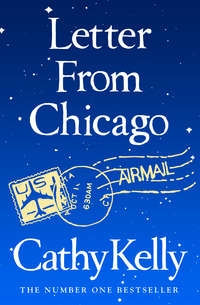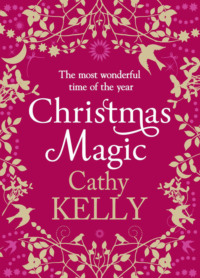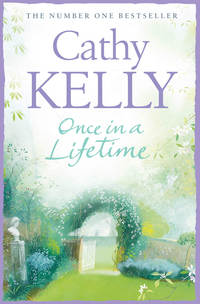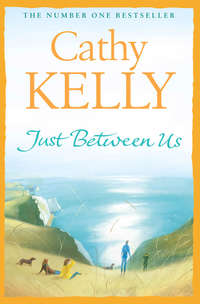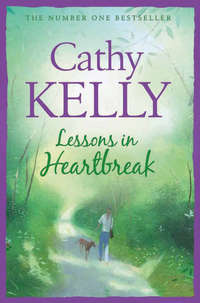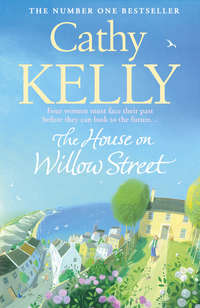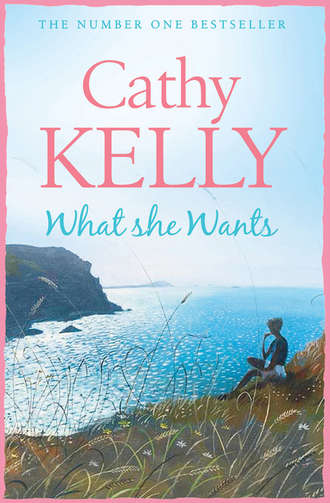
Полная версия
What She Wants

What She Wants
Cathy Kelly


Copyright
This novel is entirely a work of fiction. The names, characters and incidents portrayed in it are the work of the author’s imagination. Any resemblance to actual persons, living or dead, events or localities is entirely coincidental.
Published by HarperCollinsPublishers Ltd 1 London Bridge Street London SE1 9GF
www.harpercollins.co.uk
Copyright © Cathy Kelly 2001
Cathy Kelly asserts the moral right to be identified as the author of this work
A catalogue record for this book is available from the British Library
All rights reserved under International and Pan-American Copyright Conventions. By payment of the required fees, you have been granted the non-exclusive, non-transferable right to access and read the text of this ebook on screen. No part of this text may be reproduced, transmitted, downloaded, decompiled, reverse engineered, or stored in or introduced into any information storage and retrieval system, in any form or by any means, whether electronic or mechanical, now known or hereinafter invented, without the express written permission of HarperCollins ebooks
HarperCollinsPublishers has made every reasonable effort to ensure that any picture content and written content in this ebook has been included or removed in accordance with the contractual and technological constraints in operation at the time of publication
Source ISBN: 9780007273935
Ebook Edition © February 2012 ISBN: 9780007389377
Version: 2017-10-28
Praise
‘A must for Kelly’s many fans; a warm, moving read.’
Daily Mail
‘Totally believable.’ Rosamunde Pilcher
‘An upbeat and diverting tale skilfully told…Kelly knows what her refars want and consistently delivers.’
Sunday Independent
‘An absorbing, heart-warming tale.’ Company
‘Her skill at dealing with the complexities of modern life, marriage and families is put to good effect as she teases out the secrets of her characters.’ Choice
‘Kelly dramatises her story with plenty of sparky humour.’
The Times
‘Kelly has an admirable capacity to make the readers identify, in turn, with each of her female characters…’
Irish Independent
To Francis and Lucy, with much love.
Table of Contents
Cover Page
Title Page
Copyright
Praise
Dedication
PROLOGUE
CHAPTER ONE
CHAPTER TWO
CHAPTER THREE
CHAPTER FOUR
CHAPTER FIVE
CHAPTER SIX
CHAPTER SEVEN
CHAPTER EIGHT
CHAPTER NINE
CHAPTER TEN
CHAPTER ELEVEN
CHAPTER TWELVE
CHAPTER THIRTEEN
CHAPTER FOURTEEN
CHAPTER FIFTEEN
CHAPTER SIXTEEN
CHAPTER SEVENTEEN
CHAPTER EIGHTEEN
CHAPTER NINETEEN
CHAPTER TWENTY
CHAPTER TWENTY-ONE
CHAPTER TWENTY-TWO
CHAPTER TWENTY-THREE
CHAPTER TWENTY-FOUR
CHAPTER TWENTY-FIVE
CHAPTER TWENTY-SIX
CHAPTER TWENTY-SEVEN
CHAPTER TWENTY-EIGHT
CHAPTER TWENTY-NINE
CHAPTER THIRTY
CHAPTER THIRTY-ONE
CHAPTER THIRTY-TWO
CHAPTER THIRTY-THREE
Keep Reading
Acknowledgments
Excerpt from The House on Willow Street
Prologue
Chapter One
About the Author
Also by the Author
About the Publisher
PROLOGUE
As yet another noisy Cork and Kerry tour bus crunched gears over the hump-backed bridge, belching out diesel fumes, Mary-Kate Donlan closed the door of her chemist shop and locked it. If any Redlion inhabitant wanted either lipstick or flu remedies in their lunch break, they could go without. Ever since her assistant Otis had been on holiday, all she’d managed for her lunch for the past few weeks was a bit of a sandwich munched between customers and she was fed up with it. Today she’d arranged to meet her niece, Delphine, for a leisurely lunch and a chat.
Wrapping her coat around her, she hurried down the village to the Widow Maguire’s, a pretty stone pub with window boxes, traditional music sessions twice a week and the best pub food for miles. She ran across the main street, a slim middle-aged woman with plain bobbed hair and not a speck of make-up on her shrewd, inquisitive face. She hurried past ‘Lucille’s: Fashions For All Occasions’ with just a brief glance in the window. Lucille’s fashions were always a little on the eccentric side. This week, the window sported plenty of knobbly knitwear in jewel colours, along with one magnificent cruise wear rig out that would probably look fine in the South of France but was a little skimpy for Kerry in October.
She slowed down when she spotted Emmet from the convenience shop ahead of her. A crotchety old bandit with a fondness for porter, Emmet would talk the hind legs off a donkey and made for a very irritating luncheon companion on account of his tendency to wax lyrical about the rare ould times as he sank his lunchtime two pints. When Emmet had nipped into the pub, Mary-Kate speeded up again. He’d have met some other poor soul by the time she got there, so she was safe.
‘Hello Lara,’ she greeted a tall red-haired woman in a stylish trouser suit who was just climbing out of the sleek silver Mercedes she’d parked outside the pub.
‘Hi,’ said Lara warmly. ‘How’s business?’
‘Mad. The place is full of hypochondriacs. I should have bought shares in a drug company.’
They both laughed. ‘How are things going for you?’ Mary-Kate asked.
‘Marvellous,’ Lara said. ‘Just sold the old O’Brien place.’
‘Shanrock Castle?’ asked Mary-Kate, impressed. A crumbling castle set in fifty acres of weed-infested parkland, only someone very rich could have afforded to buy it because they’d need to spend two fortunes renovating it. ‘Another rock star I suppose?’ The district surrounding Red-lion boasted four rock stars, at least six novelists and one eccentric classical composer. The rock stars all lived sedate lives while the crazy parties took place at the classical composer’s home. Helicopters bearing Hollywood producers were always landing on his helipad, trying to get him to write music for their blockbusters.
‘No, an actress this time. I can’t name names but she’s one of those who keeps her Oscar in the toilet.’
Mary-Kate grinned. ‘They all say that. I’m meeting Delphine for a sandwich. Do you want to join us?’
Lara said yes just as a battered beetle pulled up and a voluptuous red-head in a purple velvet coat emerged.
‘Hi, girls,’ Delphine Ryan greeted her aunt, Mary-Kate, with a kiss and hugged her old school friend. ‘I haven’t set eyes on you for ages, Lara. What’s the gossip?’
In the Widows, they discussed everything from the price of property to the appalling state of the roads.
‘There’s a pot hole on the Blackglen road the size of a swimming pool and I spend my life avoiding it,’ Lara complained. ‘If I destroy a wheel on the Merc going into it, I’m going to sue the council.’
‘I love the Blackglen Road,’ sighed Delphine. ‘There’s a beautiful old period house out there that Eugene and I would have loved to buy, but it was way beyond our price range. It was fabulous, lovely old fireplaces and a big, sprawling garden with a bit of wood at the back.’
‘You mean Kilnagoshell House, the old B & B,’ Lara said. ‘I sold it six months ago. A woman from Dublin bought it, a widow actually. Virginia Connell is her name and she’s lovely. Lonely too, I daresay. You should call out and see her, Mary-Kate.’
‘If she doesn’t want to meet people, that’s her business,’ Mary-Kate said wisely. ‘It would be wrong to intrude. When she needs people, we’ll be here.’
Lara finished her sandwich.
‘Must fly, girls. I’ve got to value the sweetest little cottage on the Killarney Road this afternoon.’
‘Not old Gearóid’s place?’ inquired Mary-Kate. ‘Are they selling it or what?’
‘Or what, I think,’ Lara said. ‘Apparently the house will belong to Gearóid’s nephew from Britain once they’ve got probate. God love him,’ Lara added with a shudder. ‘Gearóid left it in a terrible state. Then, I’ve got a viewing at the Richardsons’ farmhouse. It’s a pity they’re leaving the village, they’re nice people.’
‘I should go too,’ Delphine said, getting to her feet. ‘I’ve a facial peel, two manicures and a bikini waxing this afternoon. Bye Mary-Kate.’ She kissed her aunt goodbye fondly.
‘I am going to finish my coffee in peace,’ Mary-Kate smiled up at them, her grey eyes warm. ‘Age must have its compensations. Take care, girls.’
The two younger women walked outside.
‘It’s a lovely day, isn’t it?’ said Lara as they stood for a moment enjoying the pale October sun. ‘When the sun shines, Redlion is magical. I think the Richardsons are mad for leaving. I don’t know why anyone would ever want to sell up and leave.’
‘I know what you mean,’ Delphine said, gazing fondly up the winding main street where pastel-coloured houses appeared to doze lazily in the sunlight. ‘It’s got a healing, comforting sense to it or does that sound crazy?’
‘Not at all,’ Lara said ruefully. ‘I was on ten cups of coffee, one Prozac and at least half a bottle of wine a day when I lived in Dublin. Since I came home, I’ve discovered the calm side of myself.’
‘Lara Stanley calm!’ teased Delphine. ‘That’ll be the day.’
Lara grinned. ‘Calmer, then,’ she said. ‘But it is down to this place. It is special. You know, when I left my job in Dublin, all my colleagues thought I was mad burying myself back in the country. “Dullsville” they called it. And I told them there’s nothing dull about Redlion.’
‘We could do with a bit of dull,’ Delphine pointed out. ‘Too much happens round here. There’s going to be another one of those political think tanks in the hotel next week and the place will be swarming with media and politicians desperate to get their faces in the paper. And Mrs Rock Star up the road was in having her nails done yesterday and she told me they’re having a huge party for the album launch in November.’
‘All go as usual,’ Lara said. ‘So much for the quiet life in the country. Still, I don’t want to tell the people in the city what it’s really like here or else they’d all up sticks and move down.’
Delphine laughed. ‘And we want to keep Redlion a secret, don’t we?’
CHAPTER ONE
Hope Parker let the shopping bags sit in a heap at her feet as she stood in front of the cookery books section. Her eyes flicked past Perfect Cakes, The Definitive Chinese Cookbook, Catering for Parties and Easy Meals. A recipe book full of easy meals was not what she was looking for. They were all she ever cooked in the first place. No, she wanted a comprehensive and simple cooking book, something big, fat and informative and full of explanations of what a bain marie really was and precisely what you did with yeast and did you have to have an airing cupboard handy when you cooked with it? That was all she wanted: a book that would finally explain how to cook something that didn’t involve chicken pieces and a can of ready-to-go tomato sauce.
Her gaze moved past a massive advanced French cooking manual and she leaned closer to the shelves, trying to ignore the bookshop’s lunchtime rush. Then she spotted it, a fat tome with bright gold writing on the spine: Cooking for Cowards: Become the Queen of Your Kitchen.
Queen of her kitchen? Yes, that was exactly what Hope wanted. No more ready-made lasagne and frozen solid stuffed chicken dinners in tinfoil. But lots of home-cooked meals that would have Matt beaming from ear to ear, no longer able to tease that he never put on weight because she couldn’t cook.
Hope pulled it free from the other books and stared at the cover, hoping there was no mention of the word ‘advanced’. There wasn’t. Instead, there was a picture of an ordinary looking woman standing smiling behind a veritable feast of glistening, delicious food.
Hope flicked inside and found an introduction that was funny, easy to understand, and made no mention of buying complicated utensils before you started. She couldn’t afford to buy lots of new pots and pans and strange things for chopping up herbs.
‘Cooking really is easy,’ cooed the introduction. ‘If you’re one of those people who’ve never had the chance to learn, then let me show you how, the easy way.’
There was no implication that you had to be a twenty-something newly-married to be buying this book, no implication that thirty-seven-year-old women should be ashamed of themselves to be purchasing a cookery bible that included a section on ‘how to buy meat’.
Hope never bought meat from the butchers’. She never knew what to ask for or even what you’d do with rack of lamb if you got it. She bought her meat ready packed from the supermarket where nobody could look down on you for not knowing what a gigot was.
‘There’s no need to be scared of buying meat,’ continued the introduction, as if the writer had read Hope’s mind. ‘It’s easy once you know how.’
Sold. Hope collected her shopping, paid for the book and hurried up to Jolly’s department store, already lost in the fantasy of being a superb cook. Imagine the dinner parties they could have: Matt wouldn’t have to entertain important advertising clients on his expense account in Bath’s elegant restaurants any more. Instead, he could bring them home, and she, dressed in something elegant but sexy, would waft out of the kitchen with the scent of crème brulée clinging to her while jaded businessmen gobbled up melt-in-the-mouth things in delicately flavoured gravy, asking her why she’d decided to work in a building society instead of starting up her own restaurant?
And Toby and Millie would love it. Well, when they were older, they would. They’d think that home-made chutney and made-from-scratch mayonnaise were the norm and would smugly tell their schoolmates that their mother was the ‘best cook in the world, so there!’ Hope remembered this type of culinary boasting from her own schooldays. But she and her sister, Sam, had always stayed out of the ‘whose mother is the best cook’ arguments, knowing that whatever could be said about their aunt Ruth, that she was an excellent cook wasn’t one of them. Hope wondered, as she often did, if her mother had been any good at cooking? Aunt Ruth had never talked about things like that. Maybe Mum had been a wonderful cook. It might even be genetic: all Hope had to do was move beyond instant chicken sauces to discover that she was the next Escoffier.
In Jolly’s, she got sidetracked in the women’s department. She couldn’t resist stopping a moment to finger the pretty floral skirt, running her fingers wistfully over the soft cotton with the delicate sprigged pattern of roses. In the middle of all the new season’s dark wintry clothes, the rail of prettily patterned skirts had stood out like a wildflower meadow in a landscape of muddy ploughed fields.
Feeling the plastic grocery bags threatening to cut off the circulation to her left hand, Hope unhooked them from her wrist before indulging in a proper examination of the garment. The background colour was the pale blue of delicate Wedgwood with tiny lilac flowers mingling with tiny raspberry pink ones. Hope sighed wistfully. This wasn’t a skirt, it was a lifestyle. A lifestyle where the wearer lived in a pretty cottage with lovely, well-behaved children, cats, maybe a rabbit or two, and an adoring husband who appreciated her. This woman sewed her own cushion covers, knew how to dry lavender and could bottle fruits and vegetables instead of buying them from the supermarket. She didn’t need a safety pin to hold the top of her skirt together and she never raised her voice at the children in the morning when an entire carton of milk was spilled all over the said children’s clothes, necessitating a complete change. No. This woman wore floral perfumes that came in old-fashioned bottles, never got angry with her children and wafted around with a basket as she bought organic vegetables that still had bits of earth clinging to them. People would say things like ‘Isn’t she lovely? Wonderful mother, fantastic cook, have you tried her apple crumble? And she still manages to work…’
Yeah right. And pigs might fly. Hope patted the skirt one last time and picked up her shopping. She wasn’t Mrs Floral Skirt and she never would be. She was Mrs Tracksuit Bottom, whose two children were quite accustomed to her roaring ‘Stop that right now or I’ll kill you!’ She never wafted anywhere – difficult when you had a spare tyre and stocky legs – and she never talked to the neighbours long enough for them to have an opinion of her. Apart from the woman two doors up who let her dog do its business in Hope’s garden, resulting in an un-neighbourly stand-off one morning. And as for sewing cushion covers she still hadn’t managed to sew the button back on her work skirt and it had been held up with a safety pin for months. Although the good part of that was that the safety pin was of the big nappy variety and was more comfy than the constricting button had been. Thinking of work, she’d be terribly late back if she didn’t get a move on.
She shook her head as if to rid it of the remnants of the idyllic floral skirt fantasy and, collecting up her shopping, hurried into the men’s department and over to the ties. It took ages to find one she thought Matt would like: an expensive buttermilk yellow silk with a discreet pattern. Hope held the tie up against every shirt on the display; it looked lovely against the blue shirts and went particularly well with an azure striped one. She groaned in indecision.
Matt didn’t go in for blue shirts much. The grey tie was more versatile, definitely, and cheaper, but Matt loved expensive things. He’d adored that ugly key ring his boss had given him one Christmas, purely because of the designer logo stamped into the leather. She held both ties up and squinted at them, dithering as usual.
OK, the yellow it had to be. So, it cost more than the coat she was wearing, but what the hell.
The woman behind the counter daintily placed the tie in a box. Perfectly coifed, she had lovely cared-for nails, Hope noticed, and her lipstick looked faultlessly applied; as if she’d just that minute rushed out from primping in the ladies’. Hope was conscious of the fact that her own windswept fair hair was dragged back in a pony tail and her morning lipstick a thing of distant memory.
Sales assistants invariably made her feel like an unkempt road warrior. She remembered a time when she herself was always beautifully groomed, those far off days before the children, when giving herself a French manicure had been a prerequisite on Sunday evenings. These days, she spent Sunday evenings sweating over the ironing board, worrying about the week ahead and trying to match socks from the enormous laundry pile.
‘Is it a present?’ inquired the sales woman, her tone implying that there was no way someone like Hope would be coughing up for such an expensive tie otherwise.
‘Yes,’ said Hope, stifling a wicked urge to say, no, it was for her, she dressed up in men’s clothes at the weekends and, actually, was looking for a partner to go with her on a Harley-Davidson-Lesbian Day Out on Sunday.
Instead, she arranged her face into a polite expression. Being honest, there was no way she’d pay that much money for a tie otherwise. Even if as a fortieth birthday present, it was still ridiculously expensive. The only consolation was that Matt would love it. It would go with the very sophisticated new suit he’d just bought and with his image, also highly sophisticated. The only unsophisticated part of the Matt Parker experience was Hope herself. Was that the problem? she thought with a pang of unease.
Matt hadn’t been himself lately. Usually he was one of life’s optimists, happy, upbeat. But for the past few months, he’d been listless and moody around the house, only content if they were doing something; filling their time off with endless activities. He didn’t seem happy to sit and blob around on those rare occasions when the children weren’t murdering each other. Edgy, that was it. Matt was edgy, and in her dark, terrified moments, Hope was scared that it was something to do with their marriage. Or her.
‘Shall I gift-wrap it?’
‘No, I like wrapping things myself,’ Hope confessed. Anyway, getting the shop to wrap things was always a waste of time, she’d discovered, as she could never resist trying to open a bit of the wrapping paper when she got home so she could admire the gift. Invariably, the paper got ripped when she was trying to shove whatever it was back in, so why bother?
She added the tie to her selection of plastic bags and left the shop hurriedly.
Hope rounded the corner at Union Street and collided with a gaggle of tourists oohing and ahhing over the city’s elegant sandstone Georgian buildings. It was a beautiful place to live but after five years there, Hope was guiltily aware that she took Bath’s beauty rather for granted. For the first six months, she’d walked around with her neck craned, but now, she raced along like all the other residents, almost immune to the city and constantly cursing the tourists who straggled across the streets like wayward schoolchildren. She pushed open the glass door into Witherspoon’s Building Society, conscious of the fact that it was now twenty to three and she should have been back at half past two.
Mr Campbell, manager and assiduous time-keeper, was also conscious of the time.
‘You’re ten minutes late, Mrs Parker,’ he said mildly.
Hope gave him a flustered look, which wasn’t hard after her dash down Union Street. ‘I’m so sorry, Mr Campbell,’ she said breathily. ‘It’s my husband’s fortieth birthday and I was buying him a present…’
‘Never mind,’ Mr Campbell said soothingly. ‘Don’t let it happen in future.’
She rushed into the staff room, stowed her shopping in her locker, wriggled out of her navy woollen coat and hurried back to her counter.
‘How can you get away with being late and not get the face eaten off you by that tyrant?’ demanded Yvonne. Yvonne had worked at Witherspoon’s for five years, the same length of time as Hope, and complained she was still treated like a delinquent probationary by the manager.
‘Because I have an innocent face,’ replied Hope, managing to smile all the while at Mr Campbell, ‘and you look like a minx.’
Yvonne was placated, as Hope knew she could be. Yvonne liked the idea of looking minxy. And she was so good humoured that she never took offence; not like Betsey, Hope’s other good friend. Betsey took offence at everything and would have demanded to know what Hope had meant by calling her a minx.


